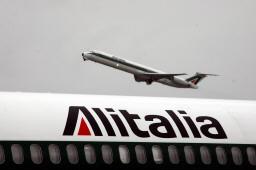The Senate on Thursday definitively approved a bill authorising a 300-million-euro loan to ailing national carrier Alitalia.
The so-called bridge loan is currently at the center of a probe by the European Commission on the grounds that it may represent an unauthorized state subsidy to the troubled airline.
The bill was approved with 154 votes in favor, 118 against and seven abstentions, which in the Senate are considered votes against.
The center-left opposition Democratic Party (PD) and the Italy of Values (IDV) party voted against the bill because the center-right government of Premier Silvio Berlusconi had financed the loan by dipping into funds earmarked for aid to small and medium-sized enterprises (SMEs).
Alitalia Chairman Aristide Police has said the loan does not violate European Union regulations because ''it is not aid, it's a loan on which the interest rates are pretty high''.
''It is no coincidence that it is called a bridge loan because it is an instrument which will help to privatize the airline and allow it to be within the market and not outside with a state subsidy,'' the chairman added.
The EC probe, announced last week, will seek to determine whether, as many of Alitalia's rivals contend, the loan constitutes state aid contravening the EU's competition rules.
One of the questions the probe must answer is whether Alitalia could have found the funds from a private investor at the same terms the government gave.
During the probe the EC will hear arguments against the Alitalia loan by other airlines. Earlier this month six airlines - British Airways, Virgin Atlantic, Finnair, SAS, Iberia and Tap - wrote to the EC arguing that Alitalia had received unfair help.
The EC probe could take up to 18 months and some observers believe that the Italian government and Alitalia hope that by that time they will have found a buyer for the Treasury's 49.9% controlling stake in the airline.
Aside from approving the loan, the Alitalia bill also set new guidelines for the carrier's privatization, which will now be directly carried out by the government.
The government has already asked Banca Intesa to act as its advisor and has left the door open to Italy's second biggest bank to invest in the privatization project.
The bill also authorises the government to convert the 300-million-euro loan into equity capital in order to maintain the airline's stock capital within legal limits.
The modifications to Italy's rules governing privatization include making it easier for potential buyers to carry out due diligence.
There is growing speculation that Alitalia may first be placed in administration to benefit from the debt protection provided by the so-called Marzano Law ,which allows major bankrupt companies to restructure.
According to the head of the international airlines' association IATA and former Alitalia chairman Giovanni Bisignani, receivership is the only way to save the carrier.
''A turnaround expert must be appointed as special commissioner to make the cuts necessary to make a dramatic financial situation sustainable,'' Bisignani observed on Thursday.
Because of the current crisis in the air transport sector, brought on by soaring fuel costs, Bisignani said he did not see any other airline in a position to step forward to buy Alitalia, while restructuring the carrier now could make it easier to sell in a year's time.
However, some observers believe that while the Marzano Law was successful for companies like Parmalat and Cirio, which produced earnings but were hurdled with massive debts, Alitalia's problems are both financial and structural.
Added to this, the nature of the air transport sector will make it very difficult for Alitalia to restructure and become competitive, they said.









